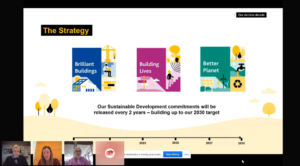Representatives from Willmott Dixon – a construction and property services firm – presented at this webinar. Topics included Willmott Dixon’s ‘Now or Never’ sustainability strategy and Collida – a new business who use an integrated built environment platform owned by, and used within, Willmott Dixon.

The Now or Never Strategy
Sustainability and social value are central to Willmott Dixon’s business approach. Launched in September 2020, Willmott Dixon’s Now or Never strategy has set out a 10 year plan to achieve net zero in their projects, within their business and with their partners. It comprises of three ambitions:
Brilliant Buildings: This relates to the end product (the building) and short- and long-term aspirations with regard to operational and embodied carbon. It ensures all new builds, refurbishments and retrofits are designed and constructed resiliently and efficiently to meet net zero in operation by 2030. It additionally reduces embodied carbon, and has a future goal of achieving net zero embodied carbon by 2040.
Build Lives: This is to better society, prosperity and social value to accommodate diversity. It influences how business is conducted and who in the supply chain is engaged with. To develop supply chain knowledge and skills in regard to climate change Wilmott Dixon are partnering with social enterprises, and are additionally supporting people facing barriers, such as gender inequality and mental health challenges.
Better Planet: This considers our ever-changing planet; Willmott Dixon want to leave every project’s site in a better state than it was inherited. This additionally follows circular economy principles, ensuring materials and components can be disassembled and reused elsewhere.
As society, technology and the climate constantly evolve, as will this strategy. To address such change, it will be reviewed and refined every second year.
Collida’s Platform
For decades much of the way construction projects have been delivered has remained the same. Collida aspire to address this. Their platform enables customers and stakeholders to be at the heart of design and decision making, offering control to craft their own buildings with support from Collida’s tools. Collida believe that in order to upgrade and achieve sustainability in construction, three aspects should be considered which comply with the Well-being of Future Generations Act:
People: This ensures designs are efficient and user friendly, particularly in the context of education, where elements including temperature and air quality can significantly impact well-being and attainment.
Planet: This involves future-proofing buildings to be climate resilient now. At present, Collida’s buildings are net zero in operation. From an embodied carbon perspective they are also on track, with a target to achieve that is 20% better than initiatives such as LETI’s.
Profit: Here profit is not defined in the traditional sense. It instead means projects that are affordable and perform well in regard to operational carbon (and embodied), while running at a low cost.
From a design perspective taking these factors into consideration enables people using the platform to make their projects as energy efficient, sustainable and as flexible as possible.

Written by Holly Passmore, Thought Leadership Consultant, Step Connect2
To Stream this Webinar On-Demand CLICK HERE.











